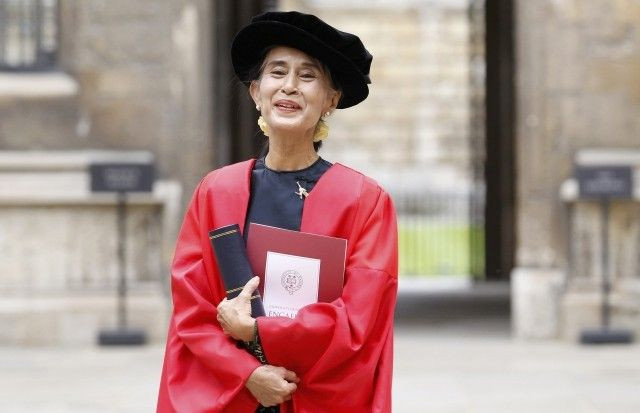Aung San Suu Kyi Addresses British Parliament, Gets Oxford PhD

Aung San Suu Kyi is back in Europe for the first time since 1988. The longtime activist and pro-democracy leader of Myanmar (formerly Burma), had been put under house arrest by the former military junta of the country for a total of some 15 years between 1989 and 2010.
She is expected to speak to the combined houses of the British Parliament on Thursday. Suu Kyi follows former South African President Nelson Mandela, Pope Benedict XVI and U.S. President Barack Obama as being one of the few who have ever done so. Yet her speech will be all the more unique since she is not a current or former head of state, though a powerful symbol of her country's movement for reform and political freedom.
Since early May 2012, she has served as an opposition member in Myanmar's parliament and as the head of the National League of Democracy, widely seen to represent the country's democratic movement. The military ruled the country from 1962 to 2010, and, in recent years, the country has begun to take gradual and limited steps to political reform and participatory government.
Suu Kyi has close ties to the UK, having spent long years studying in the country as a student. On Thursday, she received an honorary doctorate of civil law from Oxford, where she had originally studied philosophy, politics and economics as an undergraduate from 1964 to 1967.
During the most difficult years, I was upheld by memories of Oxford, she told an assembly of Oxford faculty and scholars. Those were among the most important inner resources that helped me to cope with all the challenges I had to face.
For many years you bore the burden of isolation, displaying patience and endurance to a degree not easily imagined, remarked University professor and administrator Richard Jenkyns, who presented her award.
She received the Nobel Peace Prize in Norway earlier on June 16, twenty-one years after it was first awarded to her in 1991.
Suu Kyi met with Prime Minister David Cameron Thursday morning. The British PM said she has been inspirational in her courage in fighting for democracy. At an earlier event, she participated in a tree planting with the Prince of Wales at his Clarence House home in London.
Suu Kyi's father, General Aung San, was famed for his resistance to British colonial rule and is seen as the country's leading revolutionary leader. San was the founder of the Burmese Communist Party and a prominent politican before working to found the country's army during WWII. Though first allied with Tokyo in order to oppose British rule, the general switched allegiances and led an armed revolt against Japanese occupiers in 1945.
He then negotiated independence for (then) Burma in 1947 with Prince Charles' great-granduncle Lord Mountbatten, the last overseer of British imperial governance over South Asia.
The British Empire originally conquered Burma during the 1820s to 1880s in a series of bloody and expensive wars to gain the area's vital resources of timber, oil and rubies -- still a major attraction for external investors today. After years of sanctions and economic stagnation, Asian companies are swarming into the country from neighbors China, India and Thailand in an effort to develop its rich mineral resources.
Sanctions from the West on Myanmar have only been lifted (and in the case of the U.S. only partially) in the wake of by-elections in May.
Though the country finally appears to be moving toward a brighter future, numerous internal conflicts remain. The military and democratic movements, which both represent major portions of the population, are deeply distrustful of one another (though both will call upon the legacy of leaders like San). Tensions among the country's numerous ethnic groups threaten to destabilize areas to the north and west.
Last week, violence against the Muslim Rohingya people in the country's western state of Arakan, originally sparked by the alleged rape of a Buddhist woman of the Rakhine ethnicity, drove out some 1,500 refugees into neighboring Bangladesh. Some 250,000 Rohingya have fled there since 1977, variously due to ethnic tensions and military operations in the state carried out by the central government.
© Copyright IBTimes 2024. All rights reserved.





















